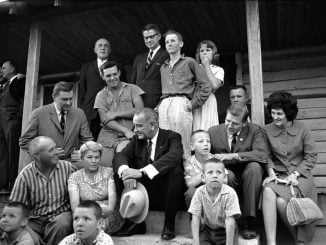
The
U.S. Treasury announced in April that notable abolitionist Harriet Tubman is
replacing Andrew Jackson on the front of the $20 bill. The announcement has
pushed Jackson, who once towered over American political life, back into the
news cycle. Much of the recent commentary on Jackson continues to denounce the
former general and president for owning slaves and for his treatment of Native
Americans. But for all the good and bad, Jackson still has an indelible
influence over North Carolina and the nation.
In
1948, President Harry Truman came to Raleigh to dedicate the statue of the
presidents born in North Carolina at the state capitol. Both Carolinas continue
to hold claim to Old Hickory as a native son. Born on the border of the Waxhaws
region, not too far from Charlotte, Jackson was praised by Truman for his courage.
Truman even made mention of his bravery during duels, just one of Jackson’s ridiculous
practices modern man would find appalling.
Referring
to the South Carolina nullification crisis, he noted the most courageous thing
Jackson did was “to stand up and tell his own people to their faces that they
were wrong.” Even at the Raleigh statue, Jackson casts a long shadow over fellow
presidents James K. Polk and Andrew Johnson.
Jackson
saved an already fracturing nation, paving an eventual path and inspiration for
Lincoln to preserve the union. In Raleigh, Truman praised North Carolinians for
honoring a man who was willing to defy his own people while remaining faithful
to the Constitution.
Jackson,
known for a hot temper, had a defiant hatred for the British. His father died
before he was born and the British wiped out the rest of his family during the
American Revolution. Captured at 13, Jackson boldly refused to shine the boots
of a British officer and was slashed across the face and hand with a sword. His
revenge: He exacted on the British empire one of the most lopsided defeats in
its otherwise illustrious military history at New Orleans in 1815.
Much
of our expansion of democracy and the modern American presidency can be traced
to Jackson. He wholeheartedly challenged federal corruption and cronyism, giving
voice to the masses that felt cut out from the government. He believed
concentrated and distant power inevitably led to greater corruption and not
social leveling. Jackson believed the government should live within its means and
would abhor the entangled web of federal taxes and regulations set up to benefit
a powerful corporate elite today. As long as federal power and corruption
expands, Jackson’s warnings standout.
For
all of his flaws, and there were many, Jackson believed that it was better for
power to rest with the people. He was called a dictator and cruelly mocked by
the country’s elites for his upbringing and lack of formal education. He was
quintessentially American. Born impoverished, he went west to seek out
opportunities, seizing them at every step. Like many Americans, Jackson became
deeper in his Christian faith through age and suffering.
According
to his biographer Robert Remini, the people had such a deep love for Jackson that
he continued to receive votes for the presidency fifteen years after his death.
While Harriet Tubman is certainly deserving of national recognition, if
changing Jackson from the front of a $20 bill feels like a slight by the
Treasury, it’s only because his shoes are perhaps too big to fill.



